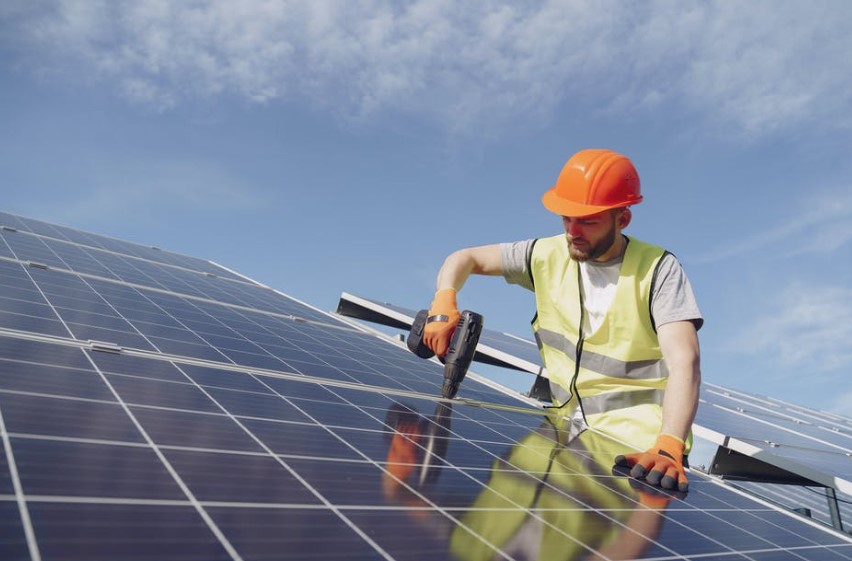Have you been thinking about solar panel costs for your home?
With the price of electricity rising over the past few years, more and more people are considering going solar. It’s the ultimate resource saver.
However, going solar isn’t as easy as buying a few panels and plugging them in. Financial considerations must be made, including figuring out how much a solar energy installation will cost you.
But how do you calculate your solar panel installation costs? This guide will give you the information you need to plan your own solar panel cost estimate.
How To Estimate Solar Panel Costs
There are many factors to consider to estimate solar panel costs. Knowing how to accurately estimate the costs of installing solar panels will help you make the right decision.
Calculate Solar Panel Cost
The solar panel cost will vary depending on many factors, such as the size of your house, the type of roof, the type of panels you choose and the brands, the installation costs, and of course, the energy output of the panels. Calculating the cost can be a daunting task, but fortunately, there are tools available online to help.
The first step is to calculate the energy needs of your house, then look at the various solar panel brands, make a comparative cost analysis, and add up the installation costs to arrive at the total estimated cost. It is also a good idea to take advantage of local and federal incentives to reduce the cost of installation. Once you have an estimated cost, you can start to explore financing options and begin the journey toward living a more sustainable lifestyle.
Know Your Electricity Usage
You must calculate the total watt-hours of electricity produced by the solar panels you intend to purchase. To understand this, you must understand your home’s electricity consumption. Calculate the average kilowatt-hours used per month on your electricity bill, then multiply it by 1,000 to get the total watt-hours of electricity produced each month.
You can then factor in the inverters, installation fees, and any additional equipment. Be sure to factor in seasonal usage and any planned increases in energy use due to home renovations. Also, look into state incentives and local programs that can help reduce your solar panel costs. Once you have a good understanding of your energy usage, you can look into different solar panel vendors and compare their prices and read reviews to see which ones may be a good fit for you.
Know How Many Solar Panels You Need
To determine how many panels you need, you will need to take into account your home’s energy requirements, the amount of space available for the panels, and any local regulations concerning installation. Additionally, you will need to factor in the size and type of each panel and then add in the costs of all associated equipment, such as the inverter and wiring.
Lastly, take into account the cost of labor, which is typically the majority of the cost. By having a good understanding of the residential solar panel requirements, you will be able to estimate the total cost for your project accurately.
Evaluate Your Sunlight Exposure
You can do this by noting the sunlight received by your windows and the direction they face, looking at the number of cloudy days you experience, as well as the length of your day/longitude. Knowing how much sunlight your home receives will help you determine how many panels you’ll need, as well as calculate the total price tag.
Once you’ve determined the number of panels, you can look into what type of panel will work best for your location and the amount of sunlight received. By doing research, you’ll be able to determine what the greatest cost-effective option is for your location and the amount of sunlight you’re receiving.
How Are Solar Panels Installed?
Estimating the cost of solar panel installation for a home is a complex and multi-layered process. Firstly, the area of the roof where the suitable home will be installed is assessed to determine the size and type of panels that will be needed. Professional installers will then review utility bills and current energy consumption to determine the scope of the solar energy system.
Once the estimate is secured, the installer will map out the details of the installation, such as the layout of the solar panels, the selected location, and the wiring. Once the layout is finalized, the installer will use modern installation methods, such as mounting and grounding the panels, connecting the cables, and connecting the panels to the home’s electrical system. Finally, the installer will inspect the completed installation and make any necessary adjustments to finalize the installation.
Is Solar System Right For Your Home?
It is recommended to examine the long-term financial benefit of a solar system and weigh it with the associated implementation costs. Additionally, researching the best solar manufacturers or suitable solar installers is recommended to ensure you receive the best results. Considering short-term and long-term savings is essential in determining if a solar system is right for your home.
Additionally, considering the current energy efficiency of your home, costs can be saved if your home is already energy-efficient. Ultimately, the answer to whether or not the solar system is right for your home depends on the current and projected cost of electricity and your home’s electricity usage. Consult solar professionals and academic resources for up-to-date information and execution of your plans to enjoy solar ownership.
Start Evaluating and Comparing Quotes for Solar Panel Systems
The solar panel costs to your home can seem overwhelming at first. However, researching local providers, taking advantage of state and federal incentives, and accurately estimating the size of your system are all effective ways of reducing the total cost. With a little preparation, going solar can be a manageable and financially beneficial decision for homeowners. To get started, talk to a local installer to fully understand the process and potential costs.
If you would like to learn more about all the latest innovations, check out our blog for more articles on solar panels and renewable energy!










